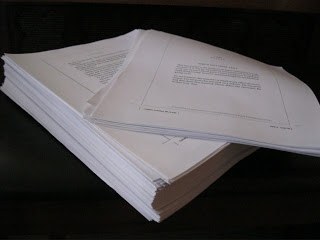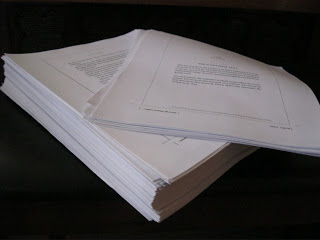“Vigorous writing is concise. A sentence should contain no unnecessary words, a paragraph no unnecessary sentences, for the same reason that a drawing should have no unnecessary lines and a machine no unnecessary parts. This requires not that the writer make all his sentences short, or that he avoid all detail and treat his subjects only in outline, but that every word tell.” (William Strunk)
I got the pages for my next Shaker novel, The Gifted, dropped at my front door yesterday. I wrote the book months ago and sent it in to the acquiring editor. Then I had to sit on pins and needles a few weeks until she had time to read it and say, “Yes, the story works.” Or words to that effect along with some “but you need to fix this or that” suggestions. Once those edits were done, the book headed on to the next editor in the publishing company.
This second editor read through the book, caught more problems with the way I told the story, discovered my pet words. I seem to have some in every book. I run through a variety of them. Just. Still. Of course. Comfort words for me. Words that help me transition my thinking while I’m writing, but words that can be repetitious and often unnecessary when noted with an editorial eye. Here, with the galleys, I could fix things, rewrite things, make the story better after the discerning eyes of the copy-editor spotted weaknesses. I could also fix the things my own editing eye was able to see after a few months away from the story.
Now, I have the pages – the stack in the photo above. At this stage of the editing process, I can’t do major rewrites. I shouldn’t need to do major rewrites. But if I did go crazy with my red pen, it wouldn’t be good because edits and corrections are harder to make once the editorial process has gotten this far along. With the pages, I got a list of queries from the editor. Things are noted that both of us missed in the first few go-arounds. Proofreaders have read the book and their sharp eyes have noted a few mistakes here and there and have questioned this or that. Things still need fixing. I need to make every word right.
Perfection is rarely possible. At least for me. There’s always something with each reading of any of my books that I think might be worded better or presented in a fresher way. This book will be no different. But I will read through it. I will pay attention to the suggested improvements. I’ll tweak a word here and there. I’ll do my very best to write the story so that when you, the reader, opens it up and begins to read that the words will disappear and the story will play out in your imagination – not as words but as images.
That’s why writers edit and polish and try to make every word tell as William Strunk advises in the quote above. Words can be beautiful. The way they’re put together can thrill the mind. And they can tell a story. That’s all I’m trying to do – tell a story. And so, I’ll read through these pages and do my best to make my words sing so that my readers will be carried away by the melody. Not perfect, but the best I can do with the help of my editor friends.
What things pull you out of a story when you’re reading? Have you noted editing or writing mistakes in the books you’ve read?
On another note, all the entries are in for my Louisville contest to celebrate Words Spoken True. The blog tour for the book was last week and reviews are popping up all over the net. I’ll be using Random.org to draw for the winners later today. I’ll let everybody know either in a newsletter or with a special post here.
Sunday, I’ll have a special guest here on One Writer’s Journal. Well known and popular author, Lyn Cote, will be sharing about her books and why she started writing about the Quakers. She’ll also be offering a free download of one of her books, so come back on Sunday to see what Lyn has to say.
Thanks for reading. Now if I can keep from sneezing long enough – I’ve caught a nasty cold – I’ll get to work on those pages.


